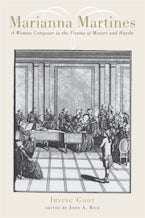
Title Details
328 Pages
22.8 x 15.2 cm
8 b/w illus.
Series: Eastman Studies in Music
Series Vol. Number:
177
Imprint: University of Rochester Press
Canonic Repertories and the French Musical Press
Lully to Wagner
- Description
- Contents
- Author
- Reviews
A bold application of the concept of "canonical" works to the development of French operatic and concert life in the eighteenth and nineteenth centuries.
This long-awaited book by a leading historian of European music life offers a fresh reading of concert and operatic life by showing how certain musical works in eighteenth- and nineteenth-century France came to be considered "canonic": that is, admirable and worthy of being taken as models. In a series of interlinked essays, William Weber draws particular attention to the ways in which such reputations could shift in different eras and circumstances.
The first chapter outlines how such a surge of reputation came about for Jean-Baptiste Lully after his death in 1687, followed a century later by one for the operas of Christoph-Willibald Gluck and Niccolò Piccinni. Next, Beverly Wilcox contributes a crucial chapter exploring how a canon of sacred works evolved at the Concert Spirituel between 1725 and 1790. Subsequent chapters detail the rise of an "incipient canon" for Joseph Haydn's music in the 1780s; a new operatic canon centered on works of Gioachino Rossini and Giacomo Meyerbeer; a century-long canonic repertory at the theater of the Opéra-Comique; and, between 1860 and 1914, frequent concert performances of excerpts from Wagner's operas, sometimes along with excerpts from Meyerbeer's.
Throughout, Weber and Wilcox demonstrate how the French musical press reflected musical taste, and also shaped it, across two centuries.
This long-awaited book by a leading historian of European music life offers a fresh reading of concert and operatic life by showing how certain musical works in eighteenth- and nineteenth-century France came to be considered "canonic": that is, admirable and worthy of being taken as models. In a series of interlinked essays, William Weber draws particular attention to the ways in which such reputations could shift in different eras and circumstances.
The first chapter outlines how such a surge of reputation came about for Jean-Baptiste Lully after his death in 1687, followed a century later by one for the operas of Christoph-Willibald Gluck and Niccolò Piccinni. Next, Beverly Wilcox contributes a crucial chapter exploring how a canon of sacred works evolved at the Concert Spirituel between 1725 and 1790. Subsequent chapters detail the rise of an "incipient canon" for Joseph Haydn's music in the 1780s; a new operatic canon centered on works of Gioachino Rossini and Giacomo Meyerbeer; a century-long canonic repertory at the theater of the Opéra-Comique; and, between 1860 and 1914, frequent concert performances of excerpts from Wagner's operas, sometimes along with excerpts from Meyerbeer's.
Throughout, Weber and Wilcox demonstrate how the French musical press reflected musical taste, and also shaped it, across two centuries.
Introduction
The Domestic versus the Foreign in Eighteenth-century Paris and London
Elements of canon Formation at the Concert Spirituel, by Beverly Wilcox
To Praise or to criticize? The evolution of music criticism in eighteenth-century France
Haydn in the press during the 1780s: How did a Canon Arise?
Parallel canons at the Opéra and the Comédie-Française at the end of the Ancien Régime
Negotiating repertory, public demand, and les progrès de la musique at the Paris Opéra, 1815-1830
Tracing the evolution of le vieux répertoire at the Opéra-Comique in the nineteenth century
Richard Wagner, concert life, and musical canon in Paris, 1860-1914
An Afterward
Bibliography
Notes
The Domestic versus the Foreign in Eighteenth-century Paris and London
Elements of canon Formation at the Concert Spirituel, by Beverly Wilcox
To Praise or to criticize? The evolution of music criticism in eighteenth-century France
Haydn in the press during the 1780s: How did a Canon Arise?
Parallel canons at the Opéra and the Comédie-Française at the end of the Ancien Régime
Negotiating repertory, public demand, and les progrès de la musique at the Paris Opéra, 1815-1830
Tracing the evolution of le vieux répertoire at the Opéra-Comique in the nineteenth century
Richard Wagner, concert life, and musical canon in Paris, 1860-1914
An Afterward
Bibliography
Notes
"Deftly illustrate[s] the rise and fall of various canonic repertories in France from the eighteenth through the early twentieth century. Many of these historical canons turn out to be surprisingly ephemeral, often lasting, as Weber explains, approximately three generations...Offers musicologists refreshing...ways to describe and discuss the drastic event of sounding music rather than to engage in gnostic interpretations. It offers music administrators practical analyses and historical examples of the process of refreshing and renewing stagnant canonic repertoires." MUSIC LIBRARY ASSOCIATION NOTES
"Will be required reading for discussions of canonic thinking and musical institutions in France...Contains nuanced writing on important concepts and distinctions. The scope and quality of the research underpinning this book mean that it presents an essential history that will provide a new basis from which to advance our understanding of canon formation. This is vital work." MUSIC & LETTERS
Hardcover
9781648250163
April 2021
£105.00 / $125.00
Ebook (EPDF)
9781800103290
April 2021
£24.99 / $29.95
Ebook (EPUB)
9781800103306
April 2021
£24.99 / $29.95
Title Details
328 Pages
2.28 x 1.52 cm
8 b/w illus.
Series: Eastman Studies in Music
Series Vol. Number:
177
Imprint: University of Rochester Press
















